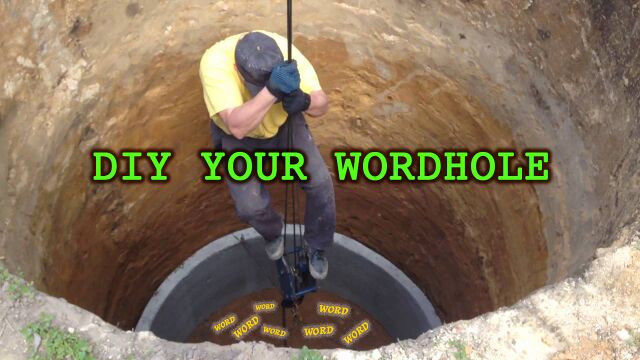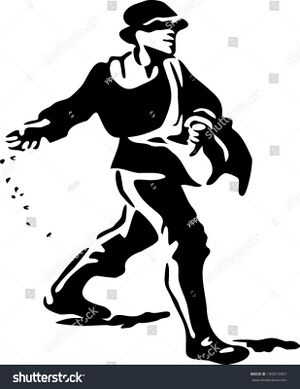Wordhole
Back to base: https://pad.xpub.nl/p/Wed-11-Oct23
This page contains a glossary created in the XPUB 2023-2024 Special Issue 'Protocols for an Active Archive'.
Accessibility
Analog
Archive
Sample Word
Active Archive
Annotation
Aporee
Audacity
NOTE: this entry is TRANSCLUDED
1. A willingness to take bold risks.
2. The name of a software package which records sound and manipulates sound recordings.
Application (as used by us)
to make recordings for Worm radio broadcasts
See also: field recording
Authorship
Brainstorming
Definition
A technique that involves the spontaneous exchange of ideas from members of the group to find a conclusion for a specific problem.
Application (as used by us)
How do we brainstorm:
- Visualizing our goal
- Documenting the discussion
- Thinking aloud
- Encouraging every idea
- Collaborating instead of criticizing
- Asking questions
See also: Visual mapping
Breakfast lab
Broadcasting
Oxford Dictionary: /ˈbrɔːdˌkɑːstɪŋ/
noun
1. the transmission of programmes or information by radio or television. "the state monopoly on broadcasting"
Control
Control Societies
NOTE: This entry is TRANSCLUDED
Gilles Deleuze discusses the concept of a society of control in his 1992 text 'Postscript on the Societies of Control'. Societies of control are governed by codes, which give access or bar individuals from flows of information, at "informational intersections" and, as a result, the subject flows “in a continuous network.” Deleuze contrasts control societies with disciplinary societies, as theorised by Foucault, which are governed by the control of discreetly defined spaces through the execution of social protocols. However, control societes, Deleuze argues, are distinct from disciplinary societies (as theorised by Michel Foucault) but in connection to them, as their immediate development after WWII. Control societies are reforming the institutions of disciplinary societies, including prisons, hospitals and schools, but one can go further and think of how eg. genetic engineering or pharmaceutical research is conducted. Reflecting on Foucalt's analysis of disciplinary societies, Deleuze reminds us that subjects in disciplinary societies are constituted on the basis of two axes: 'number' and 'signature', and are tangible and clearly witnesses in our society. These organising principles are of less importance within control societies and instead codes are implemented. Such codes govern who can access what. This is especially evident not only in the end-barrier but in the systems of tracking and actual control that defines whether one qualifies to cross a barrier. Some methods of control, that could have been borrowed from previous societies of sovereignty, are becoming interchangeable. At the time the essay was written, Deleuze could already perceive a crisis of the institutions as new mechanism of controls were being installed and implemented in different types of systems: school, prison, hospital and corporate. The question that arose was how unions would survive the advent of new, harmful forms of societies of control.
Application (as used by us)
Collective Annotation of Postscript on the Societies of Control: https://pad.xpub.nl/p/PostscriptControlSocieties
Subgroup Annotation of Postscript on the Societies of Control: https://pad.xpub.nl/p/Deleuze_Control_Group
Citation: Mentioned in: Deleuze, G., Postscript on the Societies of Control (1992)
ChopChop
Code
NOTE: This entry is TRANSCLUDED
Oxford dictionary: /kəʊd/noun
1.a system of words, letters, figures, or symbols used to represent others, especially for the purposes of secrecy. "the Americans cracked their diplomatic code"
2. COMPUTING: program instructions.
Copyleft
Copyright
Collaborative
Communication
The word "communication" has its root in the Latin verb "communicare", which means "to share" or "to make common". Communication is usually understood as the transmission of information.
The evolution of human communication took place over a long period of time. Humans evolved from simple hand gestures to the use of spoken language. Most face-to-face communication requires visually reading and following along with the other person, offering gestures in reply, and maintaining eye contact throughout the interaction.
CSS
Consent
Data
Death of the Author
Essay by Roland Barthes, published in 1967. Barthes claims here that the meaning of a text is given not by the author but by the reader. It belongs to a school of literary theory and criticism called reader-response criticism with applications not only in literature but in fields such as psychology and philosophy.
Citations
The text has been extensively citated and not always in a good way, as eg. in Jacques Derrida's ironic essay "The Deaths of Roland Barthes".
In context
One of the most well-known applications of this text is in critical pedagogy, advocating dialogic learning (letting students arrive to their own conclusions, rather than being fed the meaning of a text).
Deconstruction
Definition
1. "Deconstruction challenges the way we interpret meaning. It identifies the central meaning and marginalized meaning of a work, changes the positions of those meanings, and therefore shows that the marginalized meaning could just as easily become the central meaning. In this way, meaning is shown to be unstable."
2. Deconstruction is a form of textual analysis. Deconstruction implies "breaking down" something to discover its true significance and create new meanings.
Application (as used by us)
- Deconstruction in critical thinking can be used to find something new by breaking the text or taking a concept to pieces. Firstly we deconstruct the archive to be able to activate it. It can generate new meanings through the interpretation, analysis, discussion.
- Decontruction can be used as a form of critique
Application in other contexts (examples) Why does Derrida refuse to define deconstruction? Derrida writes, there is nothing that could be said to be essential to deconstruction in its differential relations with other words. In other words, deconstruction has to be understood in context. This kind of fluidity also prevents the possibility of defining deconstruction.
In context Friendrich Nietzsche - there are no facts, only interpretations
Decision making process
Digital
Digital is the representation of physical items or activities through binary code. When used as an adjective, it describes the dominant use of the latest digital technologies to improve organizational processes, improve interactions between people, organizations and things, or make new business models possible. The word digital comes from Latin digitus = finger, which refers to the bit yes/no structure of the information - the finger is either up or down.
Link: https://www.gartner.com/en/information-technology/glossary/digital-2 https://www.oed.com/dictionary/digital_n?tab=meaning_and_use#6774585
Digital(post)
Disciplinary Societies
NOTE: This entry is TRANSCLUDED
According to Michel Foucault, disciplinary societies are characterized by a constant passage from closed structure to closed structure, namely from the family to the school to the factory etc. The idea behind a disciplinary society is to group and organize individuals for a more effective distribution of labor.
In Discipline and Punish, Foucault traces the introduction of prisons into society; the movement away from public executions towards carceral systems and several implications of these historical changes. Discipline is closely connected to increasing bureaucracy and the development of biopolitics.
Foucault doesn't fail to mention the way disciplinary societies indirectly shape mentalities that work around their structure, and how rites are developed to protect a sense of self and a sense of pride through niche, anti-authoritarian communities.
Steve's notes on the difference between disciplinary and control societies:
"In Foucault disciplinary society is governed by ‘precepts’ (“texts” establishing protocols of behavior, discipline and social organization) which govern spaces. Society organized through capsularity (sic?): in which specific spaces have specific functions and specific "means of correct training". “In the disciplinary societies one was always starting again (from school to the barracks, from the barracks to the factory)” Each space has its own discourse (specialist language) which regulates them. In Foucault’s discipline society the subject internalizes discipline (becomes subject to the discourse of a given space) in which case re-form is the model (the subject under discipline is re-formed). By contrast: societies of control are governed by code- which give access or bar individuals from flows of information (at "informational intersections"). The subject flows “in a continuous network.”
- Foucault Discipline and Punish
See also: Control Societies (Wordhole)
Discipline
See also: Control Societies
Distributive
Georges Perec
Georges Perec
Writer, filmmaker and documentalist (French, 1936-1982). Member of the Oulipo group, a group of writers seeking for patterns and structures that could be used for practicing constrained writing. One of his major projects was in effect producing and working with a writing algorithm, (also using flowcharts [link]).
Context
An example of his practice can be seen in "The Machine". For the full experience, it can be best accompanied by its reading.
Gilles Deleuze
French philosopher (1925-1995), engaged in metaphysics and epistemology, specifically in issues of identity and difference. He uses the term "virtual" to describe ideas as the conditions of the actual experience. He criticizes the notion of the individual (as he accepts difference as fundamental in all experience). One of his major works (together with Felix Guattari) is Capitalism and Schizophrenia (the title is pretty much self-explanatory).
Context
In his essay "Postscript on the Societies of Control" (1990) Deleuze marks the change in the structure of society and senses the importance of code in the new order.
Glossary
Flowchart
Graphviz
GREP
A command-line utility for searching in plain-text data sets for patterns (eg. for regular expressions). It can be a powerful tool (alone or even better along other commands, for finding and handling elements in a text or list.
In context
The function of this command-line is so important that it has entered the Oxford English Dictionary (2003) both as a verb and noun. (Famous phrase: "You can't grep dead trees", referring to physical data)
Useful Link
https://man7.org/linux/man-pages/man1/grep.1.html
Graphs
Fish
Have you tried turning it on and off again?
HTML
Homofily
Memory
Performative
Definition from Sources (Merriam-Webster)
- relating to or marked by public, often artistic performance
- disapproving: made or done for show (as to bolster one's own image or make a positive impression on others)
- determined and reinforced by the repeated performance of socially prescribed acts and behaviors rather than by biological factors
- grammar: being or relating to an expression (such as a word or statement) that performs the act it specifies or that effects a transaction
Application (as used by us)
Application (In other contexts)
In How to do Things With Words. John Langshaw Austin introduces the idea of performative speech acts. Austin argues that to deliver a 'performative utterance' is to 'do something' rather than simply to report or 'state something' (Austin, 1975). Saying "I do" in the context of a wedding ceremony is an example of performative utterance given by Austin.
In Context
- 'Truly performative, [the artwork] simultaneously does something (it runs and produces output) and it states something (through both its output and its code)' (Ledesma, 2015, p.93).
- 'Codeworks can potentially be executed and thus become performative' (Arns, 2005, p.8).
Citation: Mentioned in:
- Austin, J.L. (1975) How to Do Things with Words: Second Edition. 2nd edition. Edited by J.O. Urmson and M. Sbisà. Cambridge, Mass: Harvard University Press.
- Arns, I. (2005) ‘Code as performative speech act’, Artnodes, 0(4). Available at: https://doi.org/10.7238/a.v0i4.727.
- Butler, J. (2006) Gender trouble: feminism and the subversion of identity. New York: Routledge (Routledge classics).
- Culler, J: Philosophy and Literature: The Fortunes of the Performative (2000) https://www.researchgate.net/publication/240740399_Philosophy_and_Literature_The_Fortunes_of_the_Performative
- Galloway, J. Protocol: How Control Exists After Decentralisation (2004) https://www.asounder.org/resources/galloway_protocol.pdf
- Ledesma, E. (2015) ‘The Poetics and Politics of Computer Code in Latin America: Codework, Code Art, and Live Coding’, Revista de Estudios Hispánicos, 49(1), pp. 91–120. Available at: https://doi.org/10.1353/rvs.2015.0016.
See also
Live Coding | Performance
Podcast
Prescriptive Technology
NOTE: This entry is TRANSCLUDED
The term is used in Ursula Franklin's lecture The Real World of Technology, in which "prescriptive technologies" oppose "holistic technologies".
Example: a form of "prescriptive technology" was used in Chinese bronze casting in 1200 BCE. The production required the skills of model makers, clay workers; metal workers, each of which had a specific set of tools and disciplines. This specialism represented a division of labour. Franklin makes the point that the workers naturalized their activities, so it was assumed there was only one procedure to make clay molds or work with metal.
Application (as used by us)
The “internalization” of a subject position (and of a discourse) engendered by prescriptive technology relates to Foucault's disciplinary societies and Deleuze's control societies. In a Marxist reading, "prescriptive technologies” operate at the level of ideology (they are disguised in plain sight).
Structurelessness
NOTE: This entry is TRANSCLUDED
Without structure
Application (as used by us)
The Tyranny of Structurelessness (1970-73) is a text by Jo Freeman
THE TYRANNY of STRUCTURELESSNESS (1970-73) is an article by Jo Freeman aka Joreen. The discussion of structureless in this article is based on the 'organizational form of the movement'. According to the text, "Structurelessness" is a natural response to an overly structured society, however it is organizationally impossible. Not only we can not decide whether to have a formally structured group, but also whether to have one that is structured or not. A structureless group does not exist, despite our desire to think otherwise. Any kind of group of people will eventually organize itself in some way if they come together for any kind of purpose.
The word structure is derived from the Latin structura, which means "a fitting together, building.". In a broader sense its anything put together. The relationships between family members make up a family's structure, and the way your muscles and bones fit together might be considered your body's structure.
It's a challenge to paraphrase something that doesn't seem to work nor make 'sense' because the idea of having no structure is more a theoretical ideology than it is something practical to realize (?), which makes it difficult to realize, because there will be a structure based on that there isn't a structure. So then a counter-structure (alternative) makes more sense than having no structure at all(!?!)
However, contrary to the concept, it has gone from being a concept to a tool for the elite to grab power.
Zoom Recorder
NOTE: This entry is TRANSCLUDED
A Zoom recorder is a field recorder produced by the brand Zoom. A field recorder is a piece of portable equipment used to capture ambient sound. A device that we (XPUB1) have used to record sounds around us, e.g. a morning at worm/field recordings used in the radio broadcast/interviews for the broadcast, etc.




